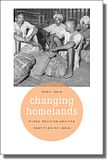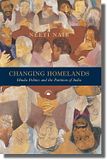Changing Homelands
Nair, Neeti:
Changing homelands : Hindu politics and the partition of India / Neeti Nair. - Cambridge, Mass.: Harvard Univ. Press, 2011. - 343 S. : Kt.
ISBN 978-0-674-05779-1
US$ 55,00 / £ 40,95 / EUR 49,50
DDC: 954.042
Indische Ausg.: Ranikhet : Permanent Black, 2011. - 356 S. - ISBN 978-81-7824-324-5, Rs. 750,00
Beschreibung
Changing Homelands offers a startling new perspective on what was and was not politically possible in late colonial India. In this highly readable account of the partition in the Punjab, Neeti Nair rejects the idea that essential differences between the Hindu and Muslim communities made political settlement impossible. Far from being an inevitable solution, the idea of partition was a very late, stunning surprise to the majority of Hindus in the region.
In tracing the political and social history of the Punjab from the early years of the twentieth century, Nair overturns the entrenched view that Muslims were responsible for the partition of India. Some powerful Punjabi Hindus also preferred partition and contributed to its adoption. Almost no one, however, foresaw the deaths and devastation that would follow in its wake.
Though much has been written on the politics of the Muslim and Sikh communities in the Punjab, Nair is the first historian to focus on the Hindu minority, both before and long after the divide of 1947. She engages with politics in post-Partition India by drawing from oral histories that reveal the complex relationship between memory and history—a relationship that continues to inform politics between India and Pakistan. [Verlagsinformation]
Aus dem Inhalt
Loyalty and anti-colonial nationalism
Negotiating a minority status
Religion and non-violence in Punjabi politics
Toward an all-India settlement
Partition violence and the question of responsibility
Memory and the search for meaning in post-partition Delhi
Glossary.
Autorin
NEETI NAIR is Assistant Professor of History at the University of Virginia. Profile page.
Quellen: Harvard University Press; Amazon; WorldCat; Permanent Black
Ähnlich
- Pogrom in Gujarat
- Llewellyn-Jones: Last King in India
- After Timur Left
- Fischer-Tiné: Shyamji Krishnavarma
- Biedermann: The Portuguese in Sri Lanka and South India
- Cederlöf: Founding an Empire on India's North-Eastern Frontiers
- Kingship in Kaśmīr (AD 1148–1459)
- Francis: Le discours royal dans l'Inde du Sud ancienne 1
- Horstmann: Jaipur 1778
- Avelar: História de Goa


